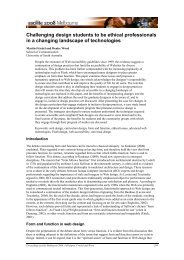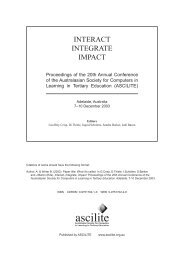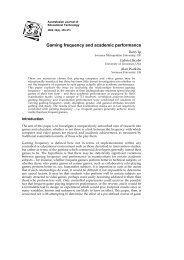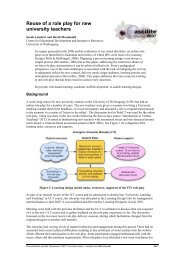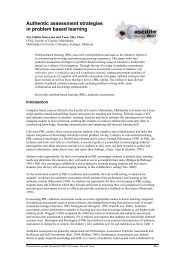Computers as a Tool for Teaching Report Writing - ascilite
Computers as a Tool for Teaching Report Writing - ascilite
Computers as a Tool for Teaching Report Writing - ascilite
Create successful ePaper yourself
Turn your PDF publications into a flip-book with our unique Google optimized e-Paper software.
Engineering students rejoice in a self image of being achievers and facilitators rather than reporters or<br />
articulate wordsmiths. This self image is particularly inappropriate with the incre<strong>as</strong>ing emph<strong>as</strong>is on<br />
communication in professional engineering, both in personal presentation and in the extensive<br />
preparation of individual and group reports.<br />
1.2. Process <strong>Writing</strong>.<br />
Various models have been proposed to understand the processes writers adopt. Such models are<br />
usually b<strong>as</strong>ed on a number of <strong>as</strong>sumptions: writing involves active and complex problem solving;<br />
writing consists of several processes - thinking, planning, generating ide<strong>as</strong>, evaluation and revision,<br />
which are invoked in a recursive manner; differences between novice and expert writers can appear<br />
both at the level of the problem addressed and in the interaction of the processes; and l<strong>as</strong>tly, that <strong>for</strong><br />
effective communication, the strategy of problem solving adopted by the writer is intimately related to<br />
the nature and purpose of the writing t<strong>as</strong>k (Hildyard, 1994).<br />
Motivation plays a strong role in cognitive per<strong>for</strong>mance, but it is not clear what that role might be in<br />
relation to writing. Selecting a topic <strong>for</strong> oneself will facilitate the process, presumably <strong>as</strong> a result of<br />
incre<strong>as</strong>ed involvement and interest (Englert, Stewart and Hiebert, 1988). Motivation in report writing<br />
is coupled directly to the enthusi<strong>as</strong>m <strong>for</strong> the t<strong>as</strong>k and topic, and engineering students must develop the<br />
required discipline, <strong>as</strong>sisted by a well-defined writing process.<br />
Even <strong>for</strong> experts, written composition remains a complex and difficult t<strong>as</strong>k. Studies on expert writers<br />
indicate that evaluation and revision are critical components of the writing process, with experienced<br />
writers focusing upon global <strong>as</strong>pects of the text. Inexperienced writers, however, tend to focus on<br />
“local” problems, such <strong>as</strong> grammar, syntax, and word choice (Hildyard, 1994).<br />
Process writing incorporates the top-down view of the writing process, emph<strong>as</strong>ising iterative<br />
refinement, and the interplay between content and expression. The limitation in the implementation of<br />
this view of the writing process h<strong>as</strong> been the unavoidable dedication and manual ef<strong>for</strong>t of writing and<br />
rewriting. Wordprocessing removes this limitation with its facilities <strong>for</strong> <strong>as</strong>sessment and revision.<br />
1.3 Wordprocessing<br />
Does the teaching of wordprocessing facilitate the enhancement of writing skill? Cochrane-Smith<br />
(1991), when discussing the research literature on word processing, posed the crucial question Do<br />
students write better with wordprocessing? and answered It depends! The effects of word processing<br />
depend on many factors: the writer’s preferred writing and revising strategies, keyboard skills, prior<br />
computer experience, available computing facilities, additional instruction and the school or university<br />
environment. Users of word processors might compose longer documents and engage in more<br />
revisions of their documents than comparable users of pen and paper.<br />
Word processing facilitates revision of the written word. A common finding in research of this nature<br />
is a correlation between good writing and higher levels of revision. Hartley (1991) describes the level<br />
of revision <strong>as</strong> a major factor that distinguishes expert from novice writers.<br />
Cochrane-Smith (1991) reports that students make more revisions when writing with a<br />
wordprocessor. However, wordprocessing alone does not improve the quality of student writing.<br />
<strong>Writing</strong> is a creative process that involves generating ide<strong>as</strong>, planning, writing and revising. However,<br />
a number of studies have shown that the introduction of word processing into instructional<br />
programmes is able to affect positively the quality of writing output (Aumack, 1985; Fisher, 1983).<br />
Engineers particularly welcome the support of a spelling checker and a grammatical appraisal.<br />
One vital factor that limits the success of word processing <strong>as</strong> a writing tool is keyboard unfamiliarity.<br />
Dybdahl and Shaw (1989) found that lack of keyboard skills w<strong>as</strong> an impediment to writing with a<br />
word processor. Poor keyboard skills may incre<strong>as</strong>e the burden of report writing and divert from the



